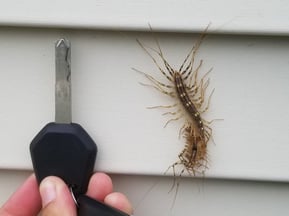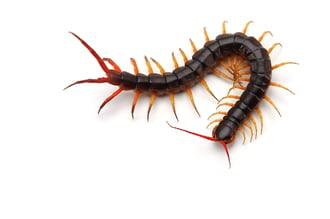Millipede Removal and Control in NJ & PA
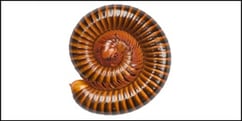
What is a Millipede?
The millipedes found in the New Jersey and Pennsylvania area are small, black and brown in color, and have segmented, worm-like bodies, although they aren't worms at all. Millipedes are actually arthropods. The name "millipede" comes from Latin origin, meaning "thousand feet." It's a common misconception that millipedes have 1,000 legs, because there have never been any recorded cases of millipedes reaching that amount. Millipedes have between 40-400 pairs of legs depending on the species, of which there about 10,000. Millipedes are slow moving and tend to curl up into a spiral when disturbed, releasing an unpleasant scent.
Why do I have millipedes?
Millipedes feed on decaying plant matter and prefer to live where they can find high levels of moisture and protection. Ideal living spaces include under rocks, mulch beds, flowerbeds, and gardens. You may see them in your home when it's too dry or hot outside and your basement provides significant moisture.
Millipedes are only a problem if their presence bothers you. They are entirely harmless to humans, do not spread disease, infest food, or cause any damage. Because they thrive outdoors, millipedes cannot reproduce indoors and will quickly die if they can't find their way back outside.
What is the difference between millipedes and centipedes?
This is one of the most common questions that people ask about millipedes. Millipedes and centipedes are both arthropods that have segmented bodies and a large amount of legs. Both insects are commonly found in New Jersey and Pennsylvania, although you're much more likely to see a centipede in your home than a millipede.
Millipedes
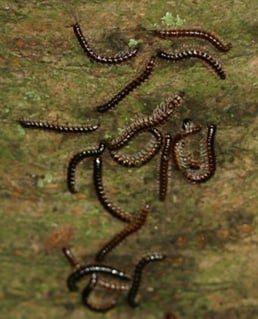
Legs: 40-400 pairs of legs depending on species
Size: typically 1-2 inches long
Color: blackish brown
Diet: decaying wood, decaying or dead plant matter, and occasionally decomposing animals
Movement: slow, curls up when in danger
Centipedes and House Centipedes
Legs: 15-177 body segments which typically have one pair of legs each
Size: 1/8-6 inches long
Color: Color varies. Common house centipedes are yellow and dark brown.
Diet: spiders, crickets, ants, cockroaches, silverfish, other small insects
Movement: rapid spurts
To learn more about centipedes, click here.
Do millipedes bite?
No, millipedes do not bite or sting. As a defense mechanism, millipedes will curl up and release an unpleasant smell. They are not dangerous, wood-destroying, poisonous, or a threat to your pets, food or possessions. If you see millipedes in your home, don't be alarmed.
How do I get rid of millipedes?
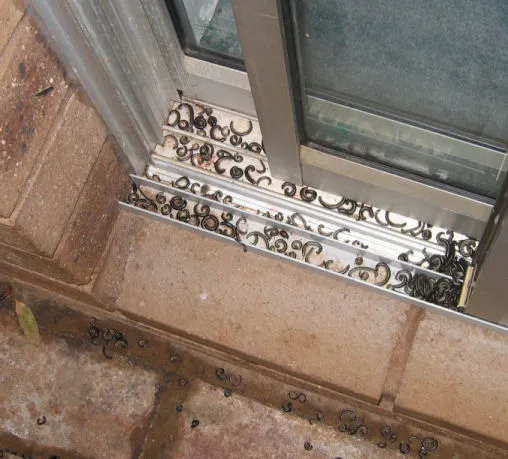
Photo Credit: https://rhondabracey.com
Millipedes can be controlled by sealing cracks and crevices that serve as entry points and keeping vegetation and moisture of any sort away from the foundation of your home. After heavy rains, it's especially likely that millipedes will be pushed into your home if an entry point exists. Especially dry or hot weather creates an uncomfortable environment for millipedes, so they may be drawn into your home if you have water damage or humidity in your basement or garage. Millipedes need plant matter to survive, which is not something that's readily available in your home. Simply vacuum them up as you see them because they will die in 24-48 hours indoors.
Addressing millipede activity in your home begins with prevention. In order to keep millipedes from getting into your home, you can seal cracks and crevices in the foundation, around doors, and basement windows. Ensure that moisture is kept away from the foundation by making sure gutters function correctly and all leaks are repaired. Millipedes aren't very big, so they don't need a large hole to enter. Finding millipedes in your home could be a sign or water damage. Examine your home and repair problem spots. Lastly, you can keep plant-life, stones, boxes, etc. away from the foundation of your home to make the area less conducive to harboring millipedes. If you follow all of these tips, you'll also be taking proactive steps to prevent other common basement pests such as spiders, crickets, silverfish, and centipedes.
How can Cooper help?
Cooper Pest Solutions does not provide millipede control or removal services for residential homeowners. If you manage or own a commercial property, please give us a call at 1-800-949-2667 for assistance.


